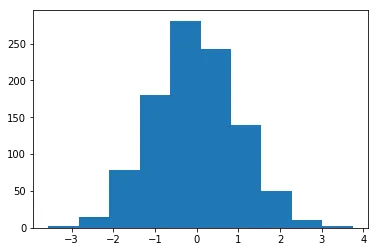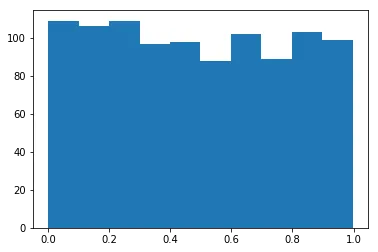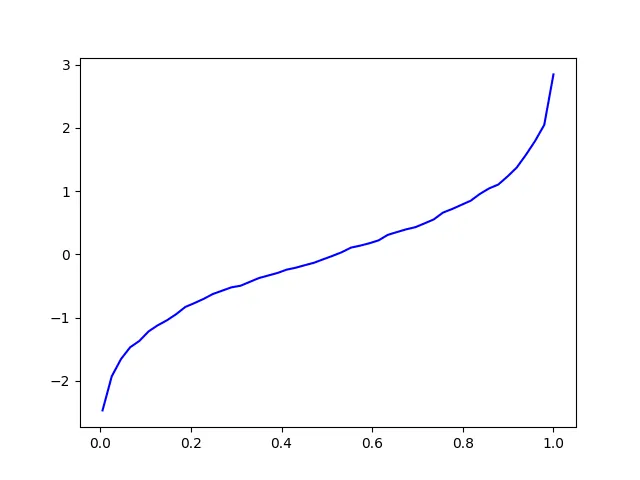5个回答
8
from scipy.stats import percentileofscore
import pandas as pd
# generate example data
arr = np.random.normal(0, 1, 10)
# pre-sort array
arr_sorted = sorted(arr)
# calculate percentiles using scipy func percentileofscore on each array element
s = pd.Series(arr)
percentiles = s.apply(lambda x: percentileofscore(arr_sorted, x))
检查结果是否正确:
df = pd.DataFrame({'data': s, 'percentiles': percentiles})
df.sort_values(by='data')
data percentiles
3 -1.692881 10.0
8 -1.395427 20.0
7 -1.162031 30.0
6 -0.568550 40.0
9 0.047298 50.0
5 0.296661 60.0
0 0.534816 70.0
4 0.542267 80.0
1 0.584766 90.0
2 1.185000 100.0
- Max Power
2
8
有许多方式可以完成这个任务,具体取决于您想使用的库以及您拥有的数据类型。
import numpy as np
# Input data
arr = np.random.normal(0, 1, 10)
在numpy数组上使用scipy.stats.percentileofscore:
from scipy import stats
np.vectorize(lambda x: stats.percentileofscore(arr, x))(arr)
在numpy数组或列表上使用scipy.stats.rankdata:
from scipy import stats
stats.rankdata(arr, "average") / len(arr)
使用 pandas.DataFrame.rank 在 Pandas DataFrame 上:
import numpy as np
df = pd.DataFrame(arr)
df.rank(pct=True)
- Marcos
2
1这比被接受的回答更好。 - ErnestScribbler
同意(+1)。我写了被接受的答案,回到这里寻找它,现在在看到这里后更喜欢使用df.rank(pct=True)。 - Max Power
1
这是一个简单的代码,用于计算列表中每个元素的百分位排名。我将给定元素的百分位定义为列表中小于或等于给定元素的元素百分比。
import numpy as np
x = [2,3,2,110,200,55,-1,0,6,45]
ptile = [ (len(list(np.where(np.array(x)<=i)[0]))/len(x))*100 for i in x]
print (ptile)
O/P
[40.0, 50.0, 40.0, 90.0, 100.0, 80.0, 10.0, 20.0, 60.0, 70.0]
- Sammy
1
对于给定的数组,你可以通过嵌套 argsort 高效地获得该数组中每个值的百分位。
my_array = np.random.randn(1000)
my_percentiles = (np.argsort(np.argsort(my_array))+1)/my_array.size
- Bruce Stoutenburg
0
这里有一种替代方法。我认为你在询问如何估计概率积分变换。这段代码生成了一个相当精细的估计,即inverted_edf。
它通过在不同值的SAMPLE中计算线性插值来进行处理。然后它计算样本经验df,最后是inverted_edf。
我应该提到,即使样本大小为1,000,尾部的百分位数也会受到相当大的统计变异性的影响,尽管0.5的情况会较少。
import statsmodels.distributions.empirical_distribution as edf
from scipy.interpolate import interp1d
import numpy as np
import matplotlib.pyplot as plt
SAMPLE = np.random.normal(0, 1, 1000)
sample_edf = edf.ECDF(SAMPLE)
slope_changes = sorted(set(SAMPLE))
sample_edf_values_at_slope_changes = [ sample_edf(item) for item in slope_changes]
inverted_edf = interp1d(sample_edf_values_at_slope_changes, slope_changes)
x = np.linspace(0.005, 1)
y = inverted_edf(x)
#~ plt.plot(x, y, 'ro', x, y, 'b-')
plt.plot(x, y, 'b-')
plt.show()
p = 0.5
print ('%s percentile:' % (100*p), inverted_edf(p))
这是两次运行的图表和文本输出。
50.0 percentile: -0.05917394517540461
50.0 percentile: -0.0034011090849578695
- Bill Bell
网页内容由stack overflow 提供, 点击上面的可以查看英文原文,
原文链接
原文链接



percentiles = [percentileofscore(arr_sorted, i) for i in arr]来计算百分位数,无需使用pandas。 - ru111